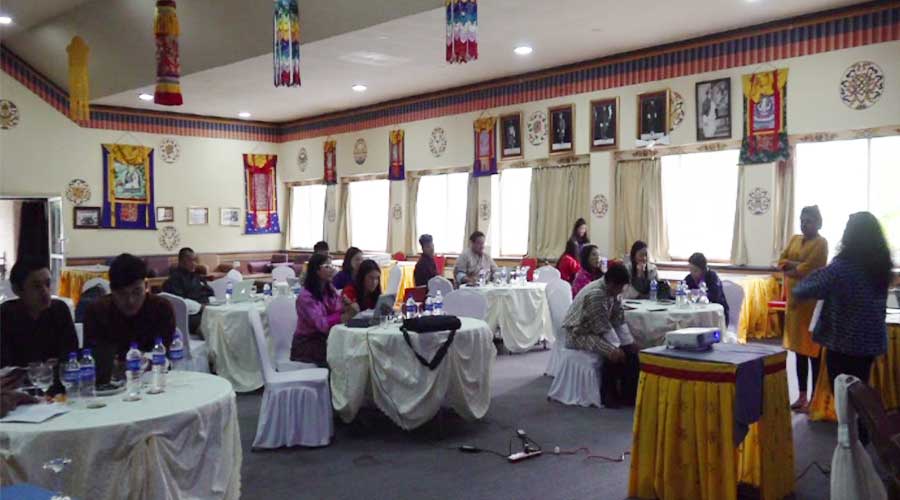
Smartphones have made access to the internet easier. With the internet flooded with misinformation and disinformation, it has also increased the risk of falling victim to fake news. To promote credible news and information in the country, the Journalist Association of Bhutan conducted the first-ever fact-checking workshop for Bhutanese journalists in Paro recently.
 From the post of Prime Minister being shifted to an Intensive Care Unit due to worsening COVID condition to a Bhutanese Dungtsho finding a traditional cure for COVID-19, social media platforms were constantly flooded with various fake news during the COVID times.
From the post of Prime Minister being shifted to an Intensive Care Unit due to worsening COVID condition to a Bhutanese Dungtsho finding a traditional cure for COVID-19, social media platforms were constantly flooded with various fake news during the COVID times.
With such fake news spreading at an alarming rate, various government and media outlets were compelled to strategically use their official social media pages as legitimate sources of information.
According to UNESCO, fake news, misinformation, and disinformation form part of the information disorder that has endangered trust in media and journalism. Moreover, with the increasing population online, the country has witnessed expanding proportions of mal-information, especially in the last few years of COVID. Today, about 90 per cent of people are active members of at least one social media site.
‘‘It became so important over the last couple of years, especially during the pandemic. Where there was so much misinformation and disinformation and we couldn’t identify what is real and what is fake. Because even fake news started to seem very real, we need that skill and we need that skill in a post-pandemic time, to be able to tell what is fact and what is fiction,” said Namgay Zam, the Executive Director of JAB.
To help journalists acquire such skills, a three-day workshop on fact-checking by professional fact-checkers from one of India’s first and leading fact-checking initiatives was held recently in Paro. More than 20 journalists took part in the workshop which ended on Wednesday.
‘‘Fact-checking is the art of debunking misinformation. Misinformation can be anything- it does not have to be political, it does not have to be newsy. Spreading some misleading part in information is misinformation. And just so that you don’t consume misinformation, you have to fact-check. So that you know what is right, what is wrong,’’ said Divya Chandra, a Fact-Checker from BooM Live in India.
‘‘Fact-checking is very new but it is a profession which is going to be very helpful to journalists and especially reporters. We get a lot of news on WhatsApp, Facebook, and Twitter” added Nivedita Niranjan Kumar, also a Fact Checker from BooM Live.
According to her, it is very important for a journalist to know what is fake news and what is miss information to avoid misleading the public.
The workshop is also expected to come in handy for journalists, especially with the approaching parliamentary elections.
‘‘It has helped us to acquire skills to fact-check. Fact check on information that is in different forms: video clips, audio clips, text, and data fact-checking. So through these skills, we will be able to fact the information and feed in the correct news,’’ said Khina Maya Ghimirey, a Freelance Journalist in Thimphu.
‘‘This training equips journalists with handles and tools that help us to cross-check the fact on any data, files, audio clips, and visual clips. In the end, when the journalist presents their stories to the readers, we have to make sure it is from a legitimate source and is the correct one,’’ said Bharat Subba, a Consultant in Thimphu.
‘‘Now we will be able to cross-check fake news and verify it. Especially during the time of the pandemic, lots of fake news had been circulated which have created panic and chaos,’’ said Damchoe Pem, a Sr. Reporter with The Bhutanese.
‘‘They taught us to use different types of internet-related apps to fact-check the news. For journalists like us, it is going to benefit us,’’ added Lhakpa Tshering, a Reporter at the Bhutan Times.
 Likewise, JAB also released a “Disinformation Toolkit” to help journalists as well as ordinary Bhutanese. The book, the first of its kind, consists of a set of tools that are expected to help understand, identify, and tackle disinformation and misinformation. By doing so, the country is expected to have a better information environment.
Likewise, JAB also released a “Disinformation Toolkit” to help journalists as well as ordinary Bhutanese. The book, the first of its kind, consists of a set of tools that are expected to help understand, identify, and tackle disinformation and misinformation. By doing so, the country is expected to have a better information environment.
Karma Wangdi/Passang Dorji
Edited by Sonam







